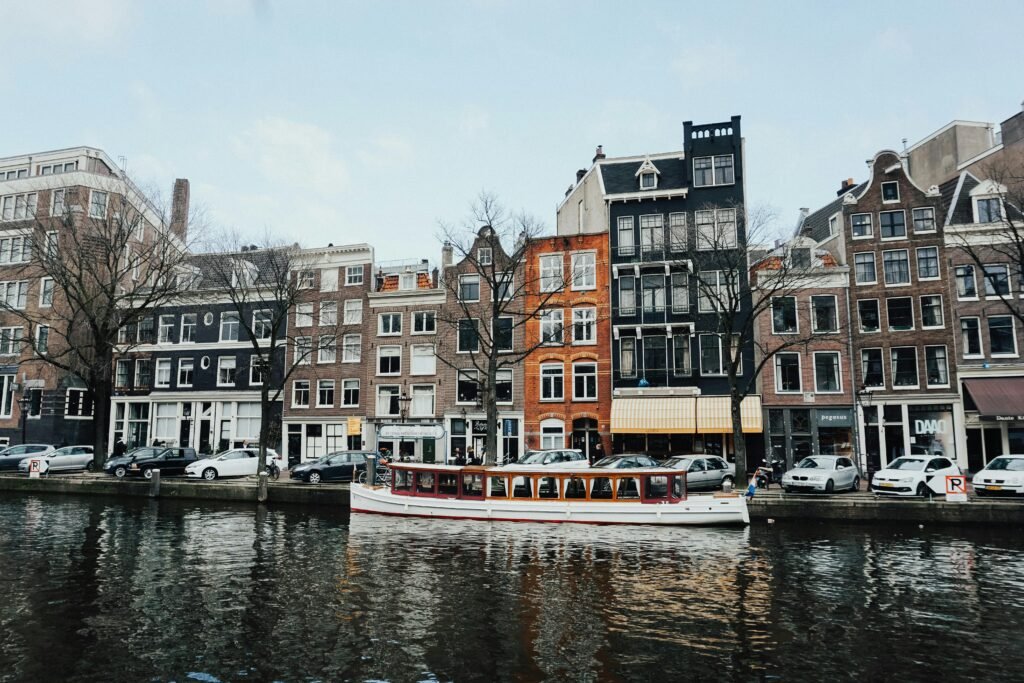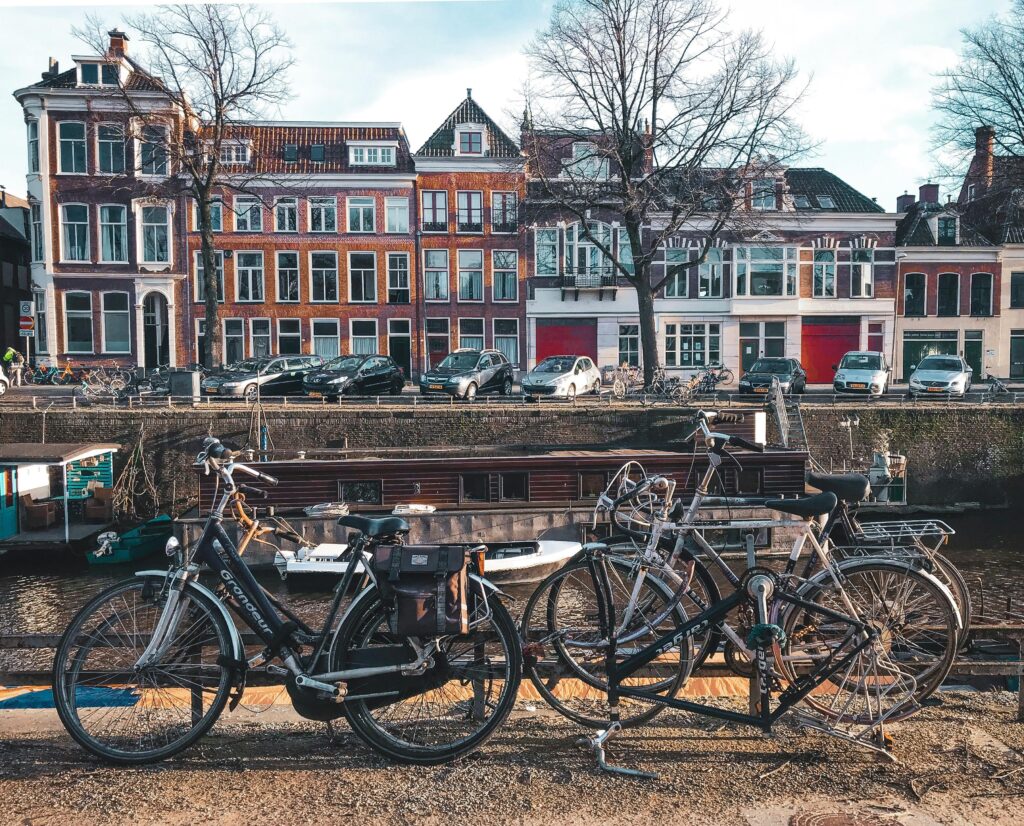Moving to the Netherlands is a great choice. But why exactly do people fall in love with this country?
First off, the lifestyle here is calm, yet dynamic. There’s a strong sense of balance, especially when it comes to work and personal life. The Dutch are known for valuing their time off—they love cycling, spending time in nature, and enjoying long weekends.
Speaking of cycling, it’s pretty much the Dutch way of life. Everywhere you look, there are bike lanes, and you’ll soon see why it’s the preferred way of getting around.
The climate is generally mild, but expect a fair bit of rain—don’t forget to pack a good raincoat or umbrella. Winters are cold, but nothing extreme, and summers are pleasantly warm, without being too hot. It’s not tropical, but if you don’t mind a little drizzle, you’ll get used to it.
When it comes to the job market, the Netherlands is a great place. It’s got a strong economy, and it’s home to many international companies. If you’re in fields like tech, finance, engineering, or logistics, there are plenty of opportunities. Plus, English is widely spoken, so even if you’re not fluent in Dutch, you can still get by in many industries.
The quality of life is another big reason people are drawn to the Netherlands. With its high living standards, excellent healthcare system, and a focus on sustainability, the Dutch make sure their citizens live well. Plus, the cities are clean, public transport is efficient, and it’s a very safe country overall.

Visa and Immigration
If you’re moving to the Netherlands, this is the first big step you’ll need to figure out.
There are a few visa types depending on why you're coming. If you’re moving for work, the Highly Skilled Migrant visa is probably your best bet. It’s designed for people who have a job offer in the Netherlands and meet certain salary requirements. Your employer will need to be a recognized sponsor for this visa, so you’ll want to check that before applying.
Another work-related option is the EU Blue Card. It’s similar to the highly skilled migrant visa but has more flexible rules and allows you to work across different EU countries. There’s also the Intra-Corporate Transfer visa if you’re being transferred by your current employer to their Dutch office.
For entrepreneurs, the startup visa is an exciting option. The Netherlands encourages innovation, so if you’ve got a promising business idea, you can apply for this visa and get support to grow your company. There’s also the self-employed visa, but this one has stricter requirements—you need to prove your business will benefit the Dutch economy.
If you’re moving to study, you’ll need a student visa, which is straightforward if you’ve been accepted to a Dutch university. And for those reuniting with family members, the family reunification visa is available if your relative has legal residency in the Netherlands.
The application process for most visas involves submitting documents like your passport, proof of finances, and in some cases, health insurance. Once you arrive, you’ll need to register with the IND (Immigration and Naturalization Service), which handles all things related to visas and residency.
Also, don’t forget about getting a BSN number. This is your citizen service number, and you’ll need it for almost everything in the Netherlands—from opening a bank account to paying taxes. You’ll get it once you’ve registered at your local municipality.
Preparing for the Move
Job hunting is a big part of moving. You must understand the Dutch job market before making the leap. Certain industries are booming, like tech, engineering, and finance, but there are also opportunities in healthcare, logistics, and agriculture. However, speaking Dutch can give you an edge in the job market, even though many companies operate in English, especially international firms.
To find a job, start by checking out Dutch job portals like Indeed.nl, LinkedIn, and Glassdoor. You can also work with recruitment agencies, which are very common here. And don’t forget about networking—it’s a smaller country, so connections can go a long way.
What about the cost of living? Well, it varies depending on where you live. Cities like Amsterdam and The Hague are more expensive, especially when it comes to housing, but smaller cities like Groningen or Eindhoven are more affordable. In general, expect to spend a fair bit on rent, utilities, groceries, and healthcare. But in return, you get a high quality of life.
Finding a place to live in the Netherlands can be a little bit hard. The housing market is competitive, especially in the big cities. If you’re looking to rent, websites like Funda.nl and Pararius.com are great places to start. Be prepared for short listings, high demand, and the possibility of paying a security deposit (usually one or two months’ rent). And always read the rental agreement carefully—tenant rights are well-protected in the Netherlands, but you’ll still want to know your obligations.

Arriving in the Netherlands
Once you’ve landed, there are a few things you’ll need to sort out right away. First, register at your local municipality (known as the gemeente). This is where you’ll get your BSN number, which you’ll need for almost everything.
Next, you’ll want to open a Dutch bank account. The process is usually simple, and you’ll need your BSN, passport, and proof of address. Some popular banks for expats are ING, ABN AMRO, and Rabobank. Having a local account will make paying rent, utilities, and other expenses much easier.
Health insurance is also mandatory in the Netherlands, so you’ll need to arrange that within the first few months of your arrival. You can choose from a variety of insurance providers, but make sure to pick one that fits your needs. Health insurance covers basic services like GP visits, hospital care, and medications, but you might need to add extra coverage for things like dental care or physiotherapy.
Getting a Dutch phone number and setting up your internet is another step to settling in. Mobile plans are affordable, and providers like KPN, T-Mobile, and Vodafone offer good deals. Internet is reliable and fast, so you’ll be connected in no time.
Everyday Life in the Netherlands
Living in the Netherlands comes with its own set of experiences and challenges. One of the first things you’ll notice is the healthcare system. It’s efficient and well-structured, but different from what you might be used to. You’ll need to register with a general practitioner (GP), as they’re the first point of contact for any health issues. If you need specialist care, your GP will refer you.
For families, the education system is another key part of life. There are plenty of public schools, which are free and follow a high standard of education. If you prefer an international curriculum, there are international schools, but these often come with hefty tuition fees. Higher education is well-regarded, with top universities offering courses in both Dutch and English.
When it comes to transportation, biking is the way to go. The Netherlands is a cyclist’s paradise, with dedicated bike lanes everywhere. You’ll probably want to get a bike as soon as you arrive. Public transport is also excellent, with reliable trains, buses, and trams. If you plan to use it often, get an OV-chipkaart, which works on all forms of public transport.
Owning a car is less common, especially in cities, but it’s possible if you prefer driving. Just be prepared for high road taxes and limited parking options in the city centers.
Driving in the Netherlands is not too different from other European countries, but you’ll need a Dutch driving license if you plan on staying long term. If you’re from an EU country, your license is usually valid, but for non-EU nationals, you might have to exchange it for a Dutch one after some time. Keep in mind that parking in cities can be tricky and expensive, so many expats stick to public transport or cycling.

Taxes and Financial Obligations
Living in the Netherlands means dealing with a few financial obligations, especially taxes. The Dutch tax system is fairly straightforward but might feel a bit overwhelming at first. If you’re working, your employer will deduct income tax from your salary, so you won’t have to worry about that. However, you’ll still need to file an annual tax return with the Dutch tax authority, called the Belastingdienst.
For expats, there’s something called the 30% ruling, which is a nice little perk. If you qualify, 30% of your salary can be tax-free for up to five years. It’s designed to attract skilled workers from abroad, so make sure to check if you’re eligible.
Apart from income tax, there are other things you’ll need to budget for, like utilities, local taxes, and social security contributions. Utilities (water, gas, electricity) vary depending on the size of your home, and many places use a metering system to track your usage. Local taxes can include things like waste disposal fees or water board taxes, which you’ll pay yearly.
Life in the Netherlands – What to Expect
Now let’s talk about what life in the Netherlands is really like on a day-to-day basis. The Netherlands is famous for having a great work-life balance, and it’s no exaggeration. People here value their personal time just as much as their professional lives. Most employees work 35-40 hours a week, and it’s common to work part-time or have flexible hours. Dutch companies are also known for being pretty relaxed when it comes to taking time off, so you’ll have plenty of chances to explore the country or take short trips around Europe.
One thing you’ll quickly notice is Dutch directness. The Dutch are known for being very straightforward—if they have something to say, they’ll say it. This can be a bit of a shock if you’re from a culture where people tend to soften their words, but it’s not meant to be rude. It’s just how things are done here. Over time, you’ll probably come to appreciate this openness.
In terms of social life, there’s plenty to do. Whether you’re into sports, arts, or just relaxing with friends, the Netherlands has something for everyone. Dutch cities are full of cafés, bars, and parks where people love to hang out. And if you enjoy being outdoors, you’ll love the vast green spaces and cycling routes that connect the cities to the countryside.
Dutch people also celebrate a lot of holidays and festivals. Some of the big ones include King’s Day (a huge street party in April where everyone wears orange), Sinterklaas (the Dutch version of Santa Claus in December), and Liberation Day in May. These are great opportunities to immerse yourself in Dutch culture and meet new people.
And don’t forget about food! Dutch cuisine might not be world-famous, but it has its gems. Try local favorites like stroopwafels, bitterballen, and the somewhat controversial haring (raw herring). Supermarkets offer a mix of Dutch products and international foods, so you’ll never feel too far from home, no matter where you’re from.
Challenges You Might Face
Of course, no guide to moving abroad would be complete without talking about the challenges you might face. Moving to a new country always comes with some difficulties, and the Netherlands is no exception.
One of the main challenges is the language barrier.
While many Dutch people speak excellent English, especially in the larger cities, there are still situations where you’ll need to speak Dutch. Simple things like grocery shopping, dealing with government forms, or going to the doctor might require some basic knowledge of Dutch. Fortunately, there are plenty of language courses available, and most immigrants find that learning even a little bit of Dutch makes life easier and helps them integrate.
Another challenge is getting used to Dutch bureaucracy.
Things like registering at the municipality, getting your BSN, or applying for benefits can involve a lot of paperwork. The Dutch are very organized, but it can sometimes feel like you’re jumping through a lot of hoops. Patience is key here, and it helps to stay organized and keep copies of all your documents.
And then there’s the cultural differences.
Dutch directness can take some getting used to, as we’ve mentioned, but so can other aspects of Dutch life. For instance, the Dutch are known for being quite frugal—they love a good deal, and it’s common for friends to split the bill at dinner (going “Dutch,” as they say). This isn’t rude, it’s just how things work. But it can be a little surprising if you’re coming from a culture where offering to pay for others is more common.
Homesickness is another challenge many foreigners face. It’s totally normal to miss home, especially during holidays or big life events. Staying in touch with friends and family back home through regular calls, and finding a community of fellow expats or locals in the Netherlands, can help ease the loneliness.
Legal and Financial Considerations
When you’re settling in, you’ll need to think about some long-term legal and financial planning. If you plan on staying for several years, you might need to renew your residence permit or apply for permanent residency. The Dutch government has clear guidelines on how long you need to live in the country before becoming eligible for permanent residency or even Dutch citizenship.
It’s also a good idea to familiarize yourself with the Dutch pension system. If you’re working in the Netherlands, you’ll contribute to the state pension system through your salary. If you stay long-term, you’ll eventually be eligible for a pension when you reach retirement age. Immigrants who plan on moving back home should also think about how they’ll manage their pensions across different countries.
In terms of financial planning, it’s essential to have a clear idea of your monthly expenses and income. The cost of living in the Netherlands can be high, especially in cities like Amsterdam, so creating a budget will help you stay on track. If you’re planning on transferring money internationally, it’s also worth looking into international money transfer services that offer better rates than traditional banks.

Tips for a Smooth Transition
To wrap things up, here are a few tips that can make your transition to the Netherlands as smooth as possible.
First, try to integrate as much as you can. Make an effort to learn Dutch, even if it’s just the basics, and try to get involved in the local culture. Whether it’s attending local festivals, joining a sports club, or simply chatting with your neighbors, these small steps can make a big difference in how settled you feel.
Don’t be afraid to ask for help. The expat community in the Netherlands is large and supportive, and there are plenty of resources to help you navigate your new life. There are immigrant forums, social media groups, or local expat organizations that will help you. You’ll soon find that many people have been in your shoes and are happy to offer advice.
And lastly, manage your expectations. Moving to a new country is a big step, and it won’t always be easy. There will be moments of frustration, confusion, and homesickness. But there will also be moments of joy, excitement, and discovery. The key is to be patient with yourself and enjoy the process of creating a new life in the Netherlands.



Comments are closed.